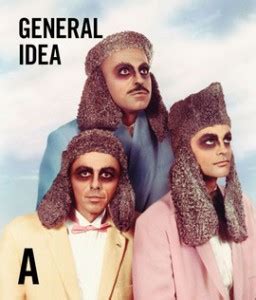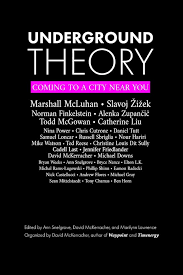- Ann Snelgrove et al, eds., Underground Theory (Boise: Theory Underground Publishing, 2023)
[McLuhan’s contribution to the volume is an unpublished typescript (reproduced as such) titled “A Letter on Lewis Mumford,” dated 1973, in which McLuhan scathingly reviews Mumford’s The Pentagon of Power (1970), which was the second volume of Mumford’s The Myth of the Machine (the first volume being Technics and Human Development (1967). Mumford concludes The Pentagon of Power with the observation that “the gates of the technocratic prison will open automatically, despite their rusty ancient hinges, as soon as we choose to walk out.”]
“Only recently [writes McLuhan] have I discovered the great lack of enthusiasm which Dr. Mumford feels for my own work which, on one had, he considers to denigrate the virtues of the book and, on the other hand, to glorify the prospects of discarnate man in the magnetic city of the electric age. … By the time I reached page 295 [of The Pentagon of Power], Dr. Mumford’s problems in dealing with the contemporary flip from hardware to software … had become very clear. … Dr. Mumford has special need to understand the nature of visual space since he, like many others, is an unwitting prisoner of its modalities, which include fixed points of view, dichotomies, classifications, panoramic descriptions, and blueprints. Thus it is this unconscious visual bias that betrays him into a pervasive habit of moral quantification, a habit of adding up the losses and gains of historical development with a fervor of moral arithmetic that equals that of any Benthamite. … Does Dr. Mumford hold that man, as supreme artifact and by-product of his own technics, has always experienced himself as private and personal amidst the pre- and post-mechanical forms of human association? Any anthropologist can disabuse Dr. Mumford of this illusion. … I study and recognize … the quite special advantages of living in this present time when the wired planet presents us [with] a magnetic city of instantly transportable and disembodied ‘spirits.’ … Dr. Mumford’s lack of a theory of communication thus deprives him of any means of [evaluating] change except in the most vaguely moralistic and descriptive terms” [pp. 121-137]
The United States as a nation is doomed … to break up into a series of regional and racial ministates; … a civil war would merely accelerate that process.
McLuhan, interview with Eric Norden, Playboy (March 1969) 68
World War III is a guerilla information war with no division between military and civilian participation.
McLuhan, Culture is Our Business (N.Y.: McGraw-Hill, 1970) 66
Jarrett Earnest, “Art is a Drug,” New York Review (11 May 2023)

“[T]he three members of General Idea … continued elaborating [their story] for decades, shifting details and emphasis with each iteration, until the fable was as hard and glittering as a diamond. Assuming the role of artists as critics, they injected themselves into a variety of cultural situations, testing what could be communicated through varying formats. In 1972 they created FILE Megazine as their artistic and conceptual mouthpiece, and in 1974 founded Art Metropole, a hub for exchanging and selling artists’ books and multiples—editions of inexpensive art objects. These two projects connected artists and writers across North America and around the world, cross-pollinating an alternative culture.
The megazine’s interior was designed as elaborate image-text collages recalling the techno-positivist communication theorist Marshall McLuhan’s picture book [sic] with Quentin Fiore, The Medium Is the Massage (1968), as well as the countercultural prophets William S. Burroughs and Brion Gysin with their cut-up techniques. General Idea adapted many ideas and phrases from Burroughs, including his dictum ‘Language is a virus,’ a mechanism of social control that perpetuates itself within its host through speech, broadcasts, and publications. ‘Image is virus’ became its catchphrase. Over the better part of twenty years General Idea created an oracular ‘voice’ in FILE, blending the positive and negative perspectives of McLuhan and Burroughs into a complex engine of theorization, cultural analysis, and literary fiction. Importantly, and above all else, they insisted that FILE was a ‘frame’ in which to resituate found materials, sharing the ideas and activities of wide swaths of artists and integrating many different kinds of work into their own.”
John Lechte, Philosophy of the Medium: The Age of McLuhan in Question (London: Bloomsbury, 2023)
Taking the principle of the ‘disappearance of the medium’ into new territory, this book questions the pervasive influence of the principle that the ‘medium is the message’. Bold and expansive, this book argues that we have for too long focused on the technical specificities of media, when we should have been focusing on what it is that mediums do, that is, on their ‘content’ rather than their formal and technical qualities. With a re-reading of McLuhan, this volume offers a study of the conflicting views of technics as a medium in Bernard Stiegler’s work as well as an investigation into the extent to which Michel Serres’ work on communication sheds light on the nature of medium. Engaging also with the concept of Object-Oriented Ontology (OOO), and the notion of probabilistic objects in quantum physics and climate change, he explores the way in which measurement is perceived to ‘create’ reality. Concluding with a fascinating study of the implications of consciousness as a medium, this book ultimately reconsiders and offers a deeper understanding of what we mean by the term ‘media’: it is that which comes ‘between’ and which facilitates the transmission of content, essentially a creator of possibilities, yet never present as such in the light of its success as a vehicle for meaning.
The End of the McLuhan Centre for Culture & Technology (1968 – 2023)
06feb23
By Alexander Kuskis, PhD
University of Toronto
In 2016, CHI was renamed once again in McLuhan’s honour as the McLuhan Centre for Culture and Technology. The Estate agreed to this with the tacit understanding that finally, a centre for McLuhan Studies would be established at the University. This was not to be. The programming since the renaming in 2016, has not been McLuhan-centred.
Realizing that the Faculty of Information had no intention of nurturing a centre for McLuhan Studies, the Estate and heirs decided to rescind permission for the use of the McLuhan name. The process, begun in May 2022, will be completed this month according to the current Dean, Wendy Duff.
The McLuhan Galaxy: https://mcluhangalaxy.wordpress.com/2023/02/06/
- Joseba Elola, “Byung-Chul Han, the Philosopher who Lives Life Backwards: ‘We believe we’re free, but we’re the sexual organs of capital,’” El Pais (8 October 2023)Han thinks that it’s a mistake to obsess about the freedom of the individual. “Marx already said it: individual freedom is the cunning of capital. We believe that we’re free, but deep down, we just produce, we increase capital. That is, capital uses individual freedom to reproduce. That means that we — with our individual freedom — are the sexual organs of capital.” He brings up one of his flagship ideas: “Under the compulsion of performance and production, there’s no possible freedom. [If] I force myself to produce more, to perform more [and] I optimize myself to the point of death… that’s not freedom.”
[“Physiologically, man in the normal use of technology (or his variously extended body) is perpetually modified by it and in turn finds ever new ways of modifying his technology. Man becomes, as it were, the sex organs of the machine world, as the bee of the plant world, enabling it to fecundate and to evolve ever new forms. The machine world reciprocates man’s love by expediting his wishes and desires, namely, in providing him with wealth.” Marshall McLuhan, Understanding Media: The Extensions of Man (N.Y.: McGraw-Hill, 1964) 46.]

Comments are closed, but trackbacks and pingbacks are open.